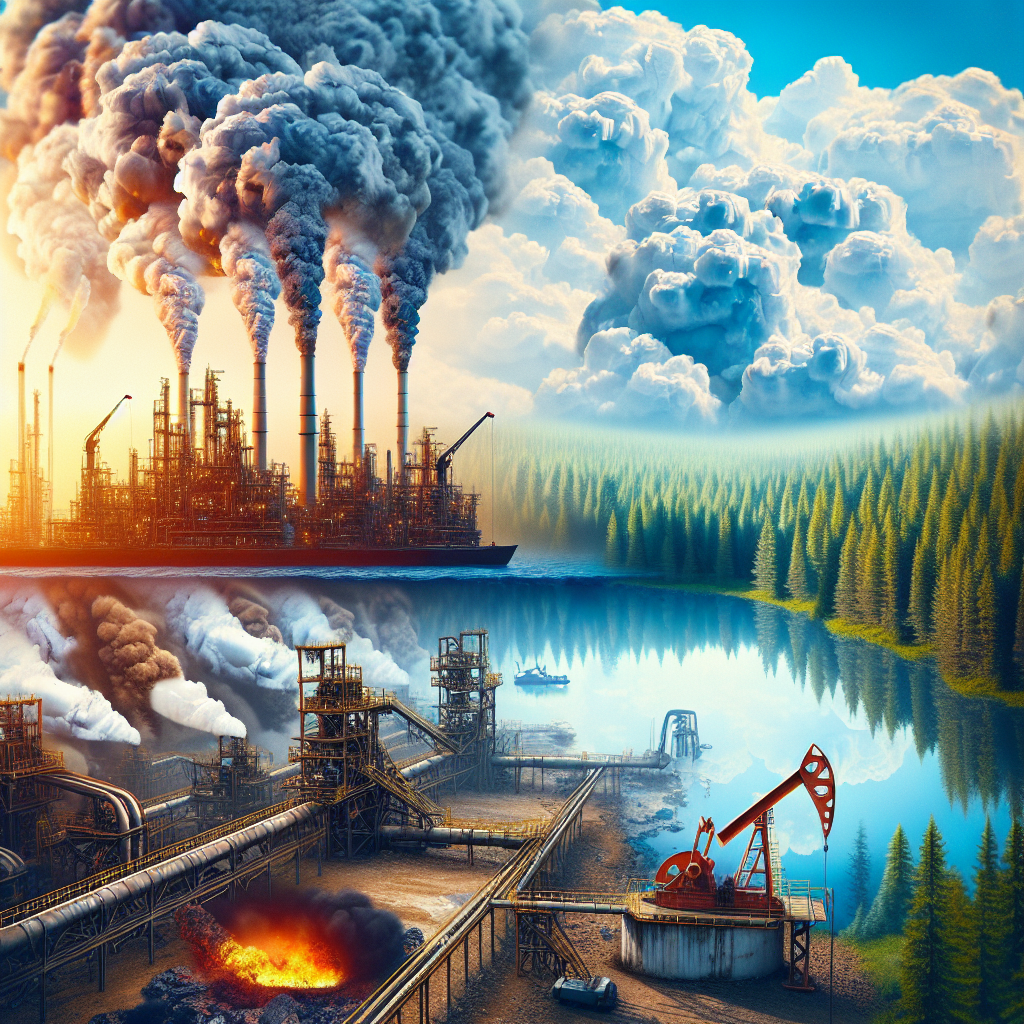Why Is It Essential To Reduce Our Dependency On Fossil Fuels?
Fossil fuels have long been the backbone of our energy systems, powering our daily lives and fueling economic growth. However, the time has come for us to seriously consider the consequences of our reliance on these finite resources. In this article, we discuss the pressing need to reduce our dependency on fossil fuels and explore the myriad reasons why this shift is essential for a sustainable future. From environmental concerns to economic considerations and technological advancements, we delve into the various factors that make this transition not only necessary but also highly beneficial. Join us as we explore the imperative need to embrace cleaner and more renewable energy sources for the well-being of both our planet and ourselves.

Check Out Our Top Eco Friendly Product Picks On Amazon Here
Environmental Impact
Air Pollution
One of the main reasons why it is essential to reduce our dependency on fossil fuels is the significant impact they have on air pollution. Burning fossil fuels releases large amounts of pollutants into the air, including carbon dioxide (CO2), sulfur dioxide (SO2), nitrogen oxides (NOx), and particulate matter. These pollutants not only contribute to the formation of smog and acid rain but also have detrimental effects on human health and the environment. By transitioning to cleaner energy sources, such as renewable energy, we can significantly reduce air pollution and improve air quality for everyone.
Minimizing Reliance on Fossil Fuels for a Sustainable Future: Why Is It Essential To Reduce Our Dependency On Fossil Fuels?
Climate Change
Another crucial reason to reduce our reliance on fossil fuels is the role they play in climate change. The burning of fossil fuels releases substantial amounts of CO2, a greenhouse gas that contributes to the Earth’s warming. This leads to various adverse effects, including rising global temperatures, melting polar ice caps, sea-level rise, extreme weather events, and disruptions to ecosystems. By shifting towards renewable energy alternatives and reducing our carbon emissions, we can mitigate climate change and help create a more stable and sustainable future for generations to come.
Water Pollution
Fossil fuel extraction, particularly through practices like fracking and offshore drilling, can result in water pollution. If not properly managed, these processes can contaminate groundwater and surface water with harmful chemicals, toxins, and oil spills. Water pollution not only affects aquatic life but also poses risks to human health when contaminated water sources are used for drinking, crop irrigation, or recreational activities. By transitioning to cleaner energy sources and implementing stricter regulations, we can minimize the risk of water pollution and protect our vital water resources.
Finite Resource
Embracing a Sustainable Future: The Imperative to Reduce Our Dependency On Fossil Fuels?
Depletion of Reserves
Fossil fuels, by their very nature, are finite resources with limited reserves. As global energy demands continue to rise, it becomes increasingly important to reduce our dependency on fossil fuels to ensure energy security in the long term. Continued reliance on depleting fossil fuel reserves will ultimately lead to resource scarcity, higher energy costs, and potential geopolitical conflicts. By shifting our focus to renewable energy alternatives, which are virtually inexhaustible, we can reduce our dependence on finite resources and create a more sustainable energy system.
Price Volatility
The price of fossil fuels is notorious for its volatility, which can have significant impacts on the global economy and individual consumers. Relying heavily on fossil fuels not only exposes us to price fluctuations but also makes us vulnerable to geopolitical tensions and conflicts in regions that dominate fossil fuel production. Transitioning to renewable energy sources can help stabilize energy prices, reduce economic vulnerability, and create a more sustainable energy market.
Check Out Our Top Eco Friendly Product Picks On Amazon Here
Health Risks
Respiratory Issues
The burning of fossil fuels releases various air pollutants, which can have severe impacts on respiratory health. Fine particulate matter and air toxins emitted from coal-fired power plants, vehicle emissions, and other fossil fuel sources can aggravate respiratory conditions such as asthma, bronchitis, and chronic obstructive pulmonary disease (COPD). By transitioning to cleaner energy sources, we can improve air quality and reduce the prevalence of respiratory issues, protecting the health and well-being of individuals and communities.
Cancer
Exposure to certain pollutants, such as benzene and formaldehyde, which are released during the burning of fossil fuels, has been linked to an increased risk of cancer. These carcinogens can contaminate the air, water, and soil, endangering not only human health but also ecosystems and wildlife. By reducing our dependency on fossil fuels and promoting cleaner energy alternatives, we can minimize cancer risks and safeguard public health.
Birth Defects
Research suggests that pregnant women exposed to air pollution from fossil fuel combustion may be at higher risk of giving birth prematurely or having babies with low birth weights. Additionally, exposure to pollutants such as lead, mercury, and polycyclic aromatic hydrocarbons (PAHs) can increase the likelihood of birth defects in newborns. By transitioning to renewable energy sources and reducing air pollution, we can protect the health and well-being of pregnant women and unborn children, ensuring the healthy development of future generations.
Energy Security
Vulnerability to Supply Disruptions
Our heavy reliance on fossil fuels, often imported from politically unstable regions, exposes us to potential energy supply disruptions. Conflicts, natural disasters, or shifts in global politics can all lead to interruptions in fossil fuel supplies, which can have severe consequences for energy security, economic stability, and overall societal functioning. Embracing renewable energy sources, which can be harnessed locally and consistently, can enhance energy security and reduce vulnerability to supply disruptions.
Geopolitical Conflicts
The pursuit and control of fossil fuel resources have historically been linked to geopolitical tensions and conflicts. Rivalries over oil-rich territories and shipping routes have often led to political instabilities and wars, endangering lives and undermining global peace. By reducing our dependency on fossil fuels and embracing renewable energy, we can diversify our energy sources and contribute to a more peaceful and stable world.

Economic Benefits
Job Creation
Transitioning to renewable energy sources has the potential to create a significant number of new jobs. The renewable energy industry, including solar power, wind energy, and hydropower, requires a skilled workforce for installation, maintenance, and operation. By investing in clean energy technologies and infrastructure, we can stimulate economic growth, provide employment opportunities, and foster a more sustainable economy.
Cost Reduction
While there may be initial costs associated with transitioning to renewable energy, the long-term benefits far outweigh the investment. Renewable energy sources, such as solar power and wind energy, are becoming increasingly cost-competitive and can provide more stable energy prices compared to fossil fuels. Moreover, renewable energy systems offer opportunities for decentralized energy production, reducing transmission losses and the need for extensive energy transportation infrastructure. By embracing renewable energy alternatives, we can reduce energy costs and create a more cost-effective and efficient energy system.
Renewable Energy Alternatives
Solar Power
Solar power is an abundant and renewable source of energy that harnesses the sun’s radiation to generate electricity. Photovoltaic (PV) technology, which converts sunlight directly into electricity, and concentrated solar power (CSP), which uses mirrors or lenses to focus sunlight, are both utilized in solar power systems. Solar power offers significant environmental benefits, including zero greenhouse gas emissions, and the ability to produce electricity in a decentralized manner. Investing in solar power can help reduce our carbon footprint, increase energy independence, and contribute to a more sustainable energy future.
Wind Energy
Wind energy is another abundant and renewable source of power that harnesses the kinetic energy of the wind to generate electricity. Modern wind turbines, typically found in onshore and offshore wind farms, convert wind power into rotational motion, which is then used to produce electricity. Wind energy offers numerous advantages, including zero greenhouse gas emissions, scalability, and the potential for energy generation in remote and rural areas. By tapping into wind resources, we can diversify our energy mix, reduce carbon emissions, and create a more resilient energy system.
Hydropower
Hydropower harnesses the energy of flowing or falling water to generate electricity. It is one of the oldest and most widely used renewable energy sources, with various forms such as conventional hydroelectric dams, run-of-river systems, and tidal power. Hydropower offers significant advantages, including high energy efficiency, low greenhouse gas emissions, and the capacity to provide baseload power. By expanding the use of hydropower, we can further reduce our dependence on fossil fuels and mitigate the environmental impacts associated with traditional energy generation.

Technological Advancements
Research and Development
Investing in research and development (R&D) is crucial in advancing renewable energy technologies and accelerating their adoption. R&D efforts can focus on improving the efficiency, reliability, and cost-effectiveness of renewable energy systems, as well as developing novel technologies and energy storage solutions. By allocating resources to R&D, we can drive innovation, overcome technological barriers, and unlock the full potential of renewable energy.
Innovation
Innovation plays a vital role in the transition to a sustainable energy future. It involves developing creative solutions, exploring new business models, and integrating renewable energy systems into existing infrastructures. Innovations in energy storage, smart grid technologies, and grid integration can enhance the reliability and flexibility of renewable energy sources, making them more viable alternatives to fossil fuels. Embracing innovation allows us to adapt to evolving energy needs, overcome challenges, and lead the way towards a cleaner and more sustainable energy sector.
Transition to Sustainable Practices
Conservation
Conservation refers to the responsible management and protection of natural resources, including energy. By adopting energy conservation practices, such as reducing energy consumption, improving energy efficiency, and optimizing resource use, we can minimize waste and preserve valuable resources for future generations. Conservation measures can be implemented on both an individual and collective level, involving practices like energy-efficient building design, efficient transportation systems, and sustainable consumption patterns.
Energy Efficiency
Improving energy efficiency is a crucial component of transitioning to sustainable practices. Energy-efficient technologies, appliances, and building designs can significantly reduce energy consumption and associated greenhouse gas emissions. By promoting energy-efficient practices in industries, businesses, and households, we can optimize energy use, lower energy costs, and enhance overall energy productivity. Energy efficiency measures can range from simple changes in behavior and lifestyle to the implementation of advanced technologies and energy management systems.

Social Responsibility
Environmental Stewardship
As custodians of the Earth, it is our social responsibility to safeguard and protect the environment for future generations. By reducing our dependency on fossil fuels and embracing renewable energy alternatives, we can demonstrate environmental stewardship and contribute to the preservation of our planet. Environmental stewardship involves promoting sustainable practices, conserving resources, and minimizing our ecological footprint. By acting responsibly, we ensure that future generations inherit a healthy and thriving environment.
Protecting Future Generations
Transitioning to renewable energy sources is a crucial step towards protecting future generations from the adverse effects of climate change, pollution, and resource scarcity. By mitigating climate change, reducing air and water pollution, and preserving natural resources, we create a more sustainable and livable world for our children and grandchildren. Embracing clean energy technologies and sustainable practices today is an investment in the well-being and prosperity of future generations.
Policy and Regulations
Carbon Pricing
Implementing carbon pricing mechanisms, such as carbon taxes or cap-and-trade systems, is essential to incentivize the transition to low-carbon energy sources. By imposing a price on carbon emissions, we can internalize the costs of climate change and create economic incentives for businesses and individuals to reduce their carbon footprint. Carbon pricing encourages the adoption of renewable energy, stimulates energy efficiency measures, and promotes the development of innovative clean technologies.
Subsidies and Incentives
Government subsidies and incentives play a crucial role in accelerating the adoption of renewable energy technologies. By providing financial support, tax incentives, grants, and favorable regulatory frameworks, governments can encourage investment in clean energy projects and help level the playing field with fossil fuel industries. Subsidies and incentives are vital in reducing the cost barriers associated with renewable energy deployment, stimulating innovation, and creating a favorable market environment for sustainable practices.
In conclusion, reducing our dependency on fossil fuels is essential for numerous reasons. The environmental impact, including air and water pollution, as well as climate change, poses significant threats to the planet and human well-being. Additionally, the finite nature of fossil fuel reserves, coupled with their price volatility, emphasizes the need for a transition to renewable energy sources. Furthermore, the health risks associated with fossil fuel combustion cannot be ignored, from respiratory issues to cancer and birth defects. Enhancing energy security and economic benefits, along with the advancement of renewable energy alternatives and technological innovations, will pave the way for a sustainable future. It is our collective responsibility to embrace sustainable practices, conservation, and environmental stewardship to protect future generations. To achieve this, effective policies and regulations, such as carbon pricing and subsidies, must be implemented to incentivize the adoption of clean energy technologies. By reducing our dependency on fossil fuels, we create a healthier, more stable, and sustainable world for ourselves and future generations.
Check Out Our Top Eco Friendly Product Picks On Amazon Here




